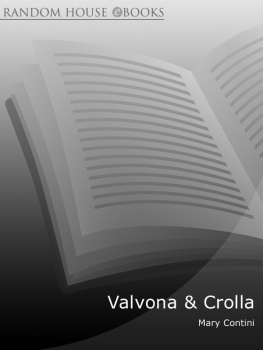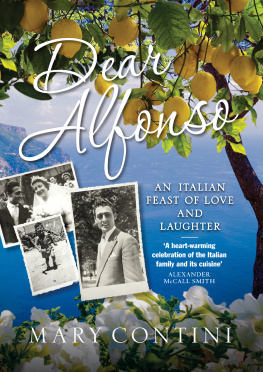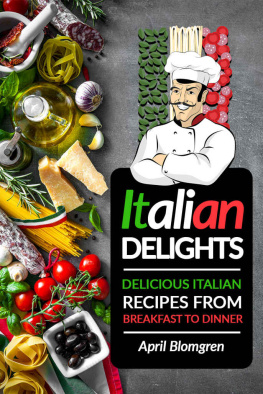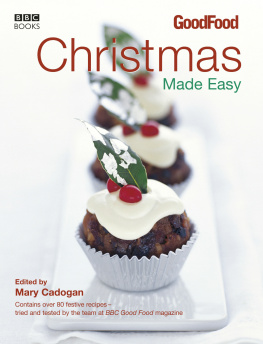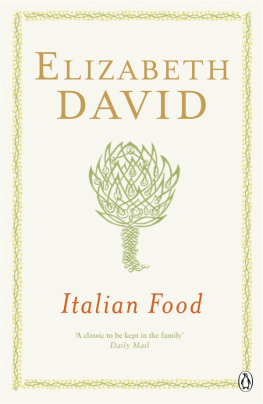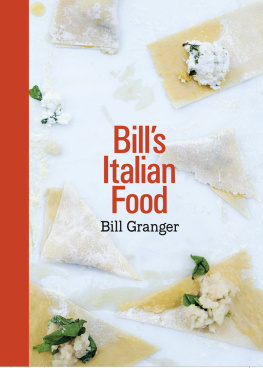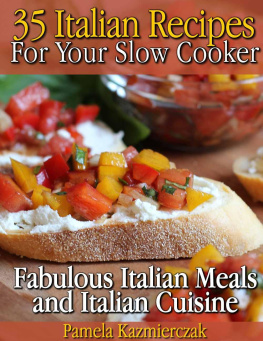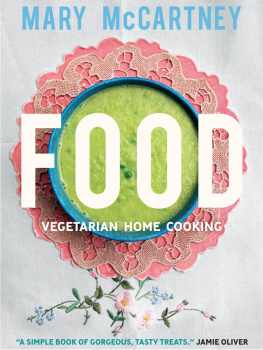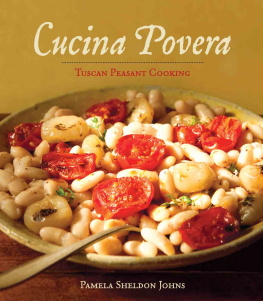Contents
List of Recipes
About the Author
MARY CONTINI, together with her husband Philip and daughter Francesca, are the directors of Valvona & Crolla Ltd, Scotland's oldest delicatessen and Italian wine merchant, and one of Europe's original specialist food shops. Founded in 1934, the business grew from humble beginnings, serving the fledgling immigrant Italian community in old Edinburgh and now lists food products and wines from around the world as well as supplying the rest of the UK via a speedy on-line delivery service. In 1996 they opened VinCaff, a wine bar, restaurant and shop in Edinburghs city centre, and 2008 saw the start of a joint venture with House of Fraser with openings in the Jenners stores in Edinburgh and Lomond Shores.
The shop has received countless accolades, including over 19 awards for Scottish Wine Merchant of the Year and Italian Wine Specialist of the Year from International Wine Challenge, Which? Wine Guide and Wine Magazine. Observer Food Monthly has described it as one of the top five independent food shops in the UK. The Caff Bar and VinCaff have also won numerous awards.
Mary Continis previous books include Dear Francesca (Ebury Press, 2002) and Dear Olivia (Canongate Books, 2006), and with Pru Irvine: Easy Peasy (Ebury Press, 1999), Easy Peasy All the Time (Ebury Press, 2001) and Easy Peasy Baking (Ebury Press, 2008).
This book is dedicated to all the skilled and enthusiastic colleagues and members of our family who have worked in Valvona & Crolla over the past 75 years, and who helped make it what it is today.
Recipe notes
Southern-Italian cooking is straightforward and relies heavily on the quality of ingredients. Seasonal and local are second nature to the lucky cooks of the South. To enjoy these dishes at their best build up the flavours with these few guidelines.
All recipes serve four unless otherwise specified; for example, where a dish may be more likely to be prepared for one person, or where ingredients are a real luxury and so the dish may be prepared as a treat for two.
All spoon measures are level, unless otherwise specified.
All vegetables, including garlic and shallots, should be peeled, unless stated otherwise. Garlic is used sparingly in Italian cooking, to give a subtle flavour rather than an overpowering taste. Use seasonal garlic wherever possible.
Choose fruit and vegetables that are locally grown and harvested in season when you can. I use organic courgettes, carrots, herbs and salads because they have a lower water content than forced varieties, and therefore more flavour. All fresh fruit, salad ingredients and herbs should be washed in cold water before use.
For best flavour choose cold-pressed extra virgin olive oil for all cooking, except for deep frying where you should use olive oil, sunflower or rapeseed oil.
All eggs should be large and free range unless stated otherwise.
Meat and poultry should ideally be free range, ethically reared and locally sourced if possible. Do source fish from a good fishmonger and use it as fresh as possible, preferably within 24 hours of purchase. All fish should be rinsed in cold water and patted dry before use.
Choose sea salt for seasoning and table salt for boiling pasta or vegetables. I prefer Maldon sea salt. Pepper should always be freshly ground; I use Parameswarans Special Wynad black pepper.
Like most southern-Italian cooks, I dry my own supply of peperoncini (hot red chillies). For the recipes in this book, I suggest you buy whole dried chillies and crush the amount you prefer into your dishes. Use according to your tastes; dishes should have a heat but not be overpoweringly spicy. Mexican or South American chillies have a completely different flavour.
Soffritto (an Italian culinary term translated as to suffer) refers to the root of many Italian recipes, which is a base of flavour made up of extra virgin olive oil with a combination of some or all of the following: garlic, peperoncini, onion, celery, carrot, parsley. Depending on the flavour required the ingredients will be finely chopped, sliced or whole. The simple rule is always they should be slowly cooked in the oil with a gentle heat and never allowed to burn.
Sugo is the Italian term for a pasta sauce, often tomato-based.
Open for business
I AM AT my happiest when I am cooking for family and friends a pot of my favourite sugo (a tomato sauce for pasta) simmering on the stove, the table set for supper and a bottle of wine open, ready to pour. My kitchen at home is warm and welcoming and my greatest pleasure is preparing food there, the more the better. I have cooked since I was very young growing up as the third-oldest in an Italian family of eight children I had no option and I cook from the recipes I have learned from my mother, mother-in-law and my grandmothers.
The dishes I cook follow the traditions, rituals and feasts of the Catholic calendar, and are in turn inextricably linked to the seasons and harvests of the south of Italy and use the natural ingredients it produces. Although strict abstinence such as no fish on Friday has fallen by the wayside, some traditions are so ingrained in my family they may never change. Baccal, salt cod, on Good Friday and roast abbacchio, milk-fed lamb, on Easter Day are sacrosanct, as are big family picnics on 15 August, Ferragosto, whether it is raining or not. I cook pasta in exactly the same way as when I was young and our favourite dishes have the tastes I remember from my childhood.
At our family shop, Valvona & Crolla, the same seasonality dictates our work. For over four generations we have been supplying goods imported from Italy and sourced from Scotland from small families who have grown up and developed alongside our company. And to our many customers who have known and loved our shop, it is those very smells of Italian cooking, coffee simmering and ripe cheeses mingling with salty hams and salamis that evoke the feeling of familiarity and trust they associate with Valvona & Crolla.
Things change, of course. Each generation of the family has reacted to circumstances and steered the business through good times and bad, making decisions and taking risks that have taken the company forward and left their mark. The company was started by Alfonso Crolla, my husbands grandfather, an immigrant shepherd from the south of Italy, who in 1934 took a share in a wholesale continental food importer called R. Valvona. Within two years he had moved the business to its present premises, a tall, narrow shop in an unassuming street at the top of Leith Walk in Edinburgh. Not long afterwards Valvona himself opted out of the business. Then, tragically, in 1940, when Italy declared war on Britain, Alfonso and his immigrant compatriots became enemy aliens and he lost his life on the Arandora Star as he and countless other Italian immigrants were being transported to Canada.
After the war, Alfonsos sons, Victor and Dominic, took over the running of the business and with their new brother-in-law, Carlo Contini, they built up a thriving trade serving the local Italian community and the returning British soldiers and officers who had experienced the joys of Italy during the war for the first time. The shop became a haven for anyone nostalgic for Italy, or wanting exotic produce and freshly roasted coffee served with a healthy dose of Italian charm.
Next page
